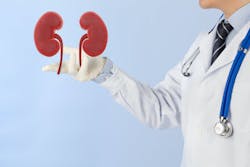In a clinical trial of patients with chronic kidney disease, an experimental drug significantly reduced albuminuria — albumin in urine, a sign of kidney damage — for 50% of participants. When the experimental drug was paired with a standard-care medication, 70% of participants reportedly experienced a significant reduction in albuminuria.
The findings were published Dec. 15, 2023, in The Lancet. The paper’s lead author is Dr. Katherine Tuttle, a clinical professor of nephrology at the University of Washington School of Medicine and executive director for research at Providence Inland Northwest Health in Spokane.
The drug candidate, BI 690517, is designed to inhibit the body’s production of aldosterone, a hormone that balances sodium and potassium levels to help regulate blood pressure. Too much aldosterone, however, speeds kidney disease’s progression.
The trial began in February 2022 and ended in July 2023. All 714 enrollees had formal diagnoses of kidney disease and were randomized to an initial eight-week therapy of empagliflozin or a matched placebo. Subsequently, 586 participants were randomly assigned to receive either BI 690517 at a daily dose of either 3 mg, 10 mg or 20 mg, or matched placebo, for 14 weeks.
The measure of efficacy was reduction in albuminuria. A clinically meaningful reduction in albuminuria levels (30% or more) occurred in half of participants randomized to receive BI 690517 alone. The response peak was seen with 10 mg doses. A substantially larger number of participants, 70%, who received both BI 609517 and empagliflozin achieved a clinically meaningful reduction in albuminuria.
In the study, BI 690517 also was associated with higher rates of hyperkalemia, compared with placebo, but most cases did not require medical intervention, the researchers wrote. In observing empagliflozin’s apparent ameliorating effects on hyperkalemia, they noted that “the magnitude of potassium reduction by empagliflozin is in line with recently reported meta-analyses including nearly 50,000 participants.”
The finding will inform a Phase 3 clinical trial, led by Oxford Population Health in England, to test the drug candidate with 11,000 patient-participants worldwide, Tuttle said.

